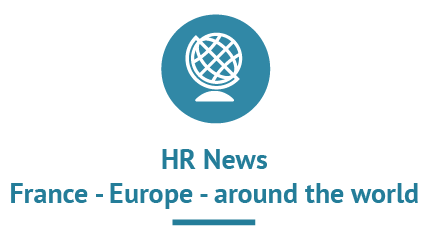|
If you are having trouble viewing this email, please
download the PDF version
or contact us.
|
 |
| #01 - January 2018 |
| PDF version - Manage your subscription - Search - Archives |

|
|
vision RH is a newsletter published by the French Directorate General for Administration and the Civil Service (DGAFP).
It draws on information sources and reports issued by public administrations, the private sector, international organisations and the press, in several different languages. It aims to provide a broad view of current human resources and civil service initiatives. |
|

|

|
| Ireland opens a major public consultation for “Our Public Service 2020” | |||||
|
Following two public service reform plans in 2011-2013 and 2014-2016, both implemented in a challenging economic context and reviewed by the OECD in July 2017, the Irish government continues its efforts to modernise the public service. An initial public consultation was conducted by the Department of Finance and the Department of Public Expenditure and Reform. This consultation was held between 13 July and 4 September 2017. It gave citizens and public servants a chance to give their views on the new action plan that the government had prepared. This action plan has the following three pillars: • delivering for the public • innovating for the future • developing the civil service's workers and its organisations The consultation, officially launched by the Minister for Finance and Public Expenditure and Reform, mobilised all government departments. In addition to gathering proposals online, this consultation involved workshop sessions attended by all public service sectors, along with researchers and experts representing civil society. The following three values emerged from the contributions: • The public service's main role is to serve the public, not a specific government, minister or governmental department. • When opting for more modern, more efficient methods of delivering public services, no segment of society should be left aside. • a professional public service, which is both skilled and well managed, is crucial to delivering services to the public. 1,029 contributions from public-sector employees (out of a total of 307,000 employees1) were received and examined. They were similar to the contributions from the general public, and corresponded to the three values listed above. Consultation responses were used to enhance the action plan. A new version of this plan is in the process of being finalised, and will be unveiled by the government soon. |
|||||
|
|||||
|
|
|||||

|
|||||

|

|

|
| France: A report on the future of HR professions in the private sector | |||||
|
To celebrate its 70th anniversary, ANDRH – a French association of HR professionals with over 5,000 members – unveiled the main findings of its study on the future of HR professions: “RH 7.0: les scénarii prospectifs des métiers ressources humaines”. This report lays out 21 potential future scenarios, underpinned by seven trends and four HR setups. It also describes seven skills and attitudes that tomorrow's HR professionals will need. The key themes are: monitoring, steering, transforming, assisting/advising, listening, respecting and measuring. |
|||||
|
|||||
|
|
|||||

|
|||||
| OECD/European Union: Public employment dashboard | |||||
|
France Stratégie has published a comparative study on public-sector employment in 19 countries, based on an analysis of recent data from the OECD and Eurostat. “France is one of the countries with the highest level of spending, but the gap with other countries is narrowing.” According to the report's authors, this “dashboard” on public-sector employment aims to provide guidance on which actions can be taken to reduce public spending as a percent of GDP. |
|||||
|
|||||
|
|
|||||

|
|||||
| Social networks: Using HR data for skills management | |||||
|
The use of HR data is becoming the main challenge for HR departments in the private sector. This is the conclusion of LinkedIn's Talent Intelligence Summit held in London in November 2017. According to LinkedIn, the world's leading professional social network, developing smart indicators and processing data will become the keys for successful recruiting and staff management in the future. |
|||||
|
|||||
|
|
|||||

|
|||||

|

|
| Denmark: Building civil servants' EU skills | |||||
|
Danish nationals are currently under-represented in the European civil service, and the Danish government expects this trend to worsen over the next decade, with 40% of Danish nationals working for EU institutions set to retire. To counter this trend, Denmark has selected 20 civil servants who will receive special training to prepare for EU civil service exams. Also, between now and 2025, it will send 100 Danish experts on EU postings with the aim of kindling their interest in a longer-term EU career. |
|||||
|
|||||
|
|
|||||

|
|||||
| France: For SNCF, “Alpha” teams to help workers retrain successfully | |||||
|
SNCF, France's railway operator, offers new, more appropriate job roles to its workers deemed “at risk” (e.g. those with disabilities, those who have trouble coping with new technologies, or who have been declared unfit for their previous jobs). These workers are organised into groups called “Alpha” teams, helping them prepare for their return to the workforce by working for local managers. At the same time, professional mobility advisers help them to finalise their retraining projects for new jobs within the SNCF group or outside. |
|||||
|
|||||
|
|
|||||

|
|||||
| United Kingdom: Recruiting more diverse civil servants | |||||
|
To reach its objective of reflecting the diversity of the British population, the UK civil service has launched the Fast Stream programme (which offers an accelerated career path to leadership roles in the civil service). Candidates may be eligible for exemption from the initial selection exams if they meet at least one of these three criteria: non-European ethnic origin, disability, or from a low-income background. |
|||||
|
|||||
|
|
|||||

|
|||||

|

|
| United States: A “succession planning” guide for senior managers | |||||
|
Noting that some federal agencies still lack an effective talent management and succession planning strategy, the OPM (which manages the federal civil service staff) has issued a guide to assist them. According to a recent survey, 61% of departing senior executives stated that no succession planning had been done before their departure, and 56% stated that they were not involved in transferring skills to their successors. |
|||||
|
|||||
|
|
|||||

|
|||||
| Italy: A joint appraisal system with performance criteria | |||||
|
In a decree enforcing provisions of the so-called “Madia Act” reforming the Italian administration, the conditions were laid out for a new joint appraisal system to take effect at the start of 2018. Government agencies and civil servants will be appraised on an annual basis. Performance reports and individual job appraisal interviews must be correlated in terms of both the goals set and the results achieved. |
|||||
|
|||||
|
|
|||||

|
|||||
| United Nations: The first country ranking for women's leadership in the civil service | |||||
|
Three Nordic countries (Sweden, Finland and Norway) held top rankings in the first Global Women Leadership Initiative Index, backed by the UN. Next came Canada and Slovenia, followed by France (which owes its good ranking to the recent increase in the number of women being appointed to “key posts with strong decision-making power”). This index is aimed at achieving progress towards parity in leadership roles. |
|||||
|
|||||
|
|
|||||

|
|||||

|

|
| Germany: Funding preventive measures | |||||
|
The average number of sick days is steadily increasing in Germany's civil service. A report by the Federal Ministry of the Interior notes an increase of five days' sick leave per year on average over the past ten years. The federal state of Brandenburg has set up a special budget dedicated to funding the measures included in the federal plan for the prevention of psychosocial risks. €50 has been earmarked for each civil servant. |
|||||
|
|||||
|
|
|||||

|
|||||
| France: The Yvelines local national health insurance office is “liberated” | |||||
|
In 2016, the Yvelines local national health insurance office (CPAM) began to implement a “liberated” organisational environment, inspired by Isaac Getz's research on liberated companies. Working hours are more flexible, the decision-making hierarchy has been simplified, employees' initiatives are welcomed, and autonomy is the priority. An initial evaluation shows that absenteeism declined by nearly 30% in one year, with a 15% increase in the number of calls answered. |
|||||
|
|||||
|
|
|||||

|
|||||
| Luxembourg: Results from the first survey on quality of life and workplace motivation | |||||
|
The first survey on quality of life and workplace motivation in the Luxembourg civil service has been carried out in collaboration with the University of Luxembourg and market research firm TNS Ilres. 6,848 civil servants (i.e. one in four) filled in an online questionnaire. An analysis of the results shows that Luxembourg's civil servants consider their autonomy and the content of their assignments to be more important motivating factors than their pay. |
|||||
|
|||||
|
|
|||||

|
|||||

|

|
| Engie, an innovative recruitment model based on soft skills | |||||
|
French energy group Engie has set up an innovative recruitment model, which it is publicising in a major ad campaign with the tagline “You are the energy the world needs”. Selecting job applicants based on their soft skills means going beyond looking at diplomas, credentials or even experience. An individual's interpersonal skills now play a crucial role in ensuring that an applicant is the right person for the job. Engie describes this ideal profile as the 5th element, in reference to the four elements that make up the resources used by the group: water, sun, earth and wind. This experiment in hiring new staff builds on “Leaders for Tomorrow”, Engie's programme for its future corporate leaders. Soft skills also hold a central place in the leadership programme, as an employee's interpersonal skills are key to being selected for this talent detection programme. |
|||||
|
|||||
|
|
|||||

|
|||||

|

|
| The Newton leadership programme for Estonian top-level civil service executives | |||||
|
Estonia has a total of 96 top-level civil service executives. Applicants for these positions must speak several languages fluently and must possess the skills defined in the Estonian Top Civil Service Competency Framework. To help them achieve this skill level, the Newton programme was created by the Top Civil Service Excellence Centre, which reports to the Prime Minister’s Office. The Newton programme is carried out in collaboration with the Praxis research centre and the Estonian Design Centre. It targets managers and specialists who are applying for these top-level executive jobs, preparing them to meet the challenges faced by the civil service in an international context. The programme lasts a calendar year, with sessions in Tallinn and Helsinki (Finland and Estonia, whose languages are closely related, launched a joint executive training programme in 2015: “Innovation Boot Camp for Public Sector Leaders, as well as in London. It combines theoretical, academic and practical approaches. Speakers come from both the public and private sectors, as well as from civil society. Special emphasis is placed on interactive learning and teamwork. Participants benefit from one-on-one support throughout the course. The designers of this innovative course have set the following goals: bolstering creativity to accelerate and steer non-stop innovation; improving participants' ability to take on complexity; providing forward-looking tools to meet today's global challenges; and designing organisations that adequately match society's needs. The training course includes four modules and lasts 160 hours: • Defining the major global trends for the decades ahead, and seeking suitable responses within the Estonian context. • Transform these trends into processes that are adapted to the public sector in terms of legal framework, resources and management procedures. • Implement the plans prepared in the first two modules through self-management, HR and process management. • Cooperation and communication. |
|||||
|
|||||
|
|
|||||

|
|||||

|
|
Share
|
||||
|
||||
| SUBSCRIBE - UPDATE YOUR SUBSCRIPTION - ARCHIVES - RSS - UNSUBSCRIBE |
|
French Directorate-General for Administration and the Civil Service (DGAFP)
Publication Manager: Thierry LE GOFF Managing Editor: Xavier MAIRE Editor-in-chief: Jean-Marc CHNEIDER Publication Coordinator and Autor: Jean-François ADRIAN Layout and graphic design: Jean-François ADRIAN and Alphania. The texts of the publication do not reflect the point of view of the DGAFP
In accordance to the French Act n°78-17 of 6 January 1978 on information technology, data files and civil liberties and to the european General Data Protection Regulation (GDPR), your personal data is stored securely and you are entitled to access, correct and delete them. To do so, you should send an e-mail to (contact-visionrh.dgafp@finances.gouv.fr) or write to DGAFP: 139, rue de Bercy - 75012 Paris; France.
Reproduction is authorized with mention of the source © DGAFP 2019 / N° ISSN: 2606-7528. |
|
|



